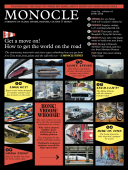
Issue 64
Transport Special: Get a move on! How to get the world on the road. The visionaries, mavericks and clever types rethinking how to get you from A to Z by train, boat, plane and the odd trike too.
In This Issue
Oops! No content was found.
Looks like we no longer have content for the page you're on. Perhaps try a search?
Return Home

